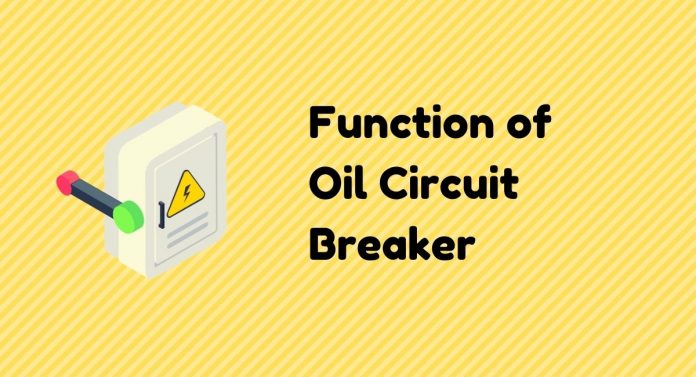An oil circuit breaker is a kind of circuit breaker which uses oil as a dielectric or insulating medium for repressing an arch. Contacts of the oil circuit breaker are separated in insulator oil.
Oil Circuit Breaker
If any fault occurs in the system, the contacts of the circuit breaker stay open under insulator oil. An arch is created in them and gas is created for the temperature in the oil. Today we will discuss function of oil circuit breaker.

What is Arch?
Arch is an electrical discharge that is created between two electrodes and creates a spark. And the voltage which is created because of the arch between two electrodes is called arching voltage.
Types of Oil Circuit Breaker
An oil circuit breaker is of two types.
- Bulk oil circuit breaker
- Low oil circuit breaker
Structure of Oil Circuit Breaker
- Making an oil circuit breaker is easy.
- It is made with two current conductive contacts covered in a strong, weatherproof metal tank. The tank is filled with transformer pyrenol oil.
- Pyrenol oil is an arch extinguisher medium. And it works as an insulating medium between earth and live line.
- Top of the oil and tank is filled with air which controls displaced oil caused by making gas. And absorbs the machinery shock of the oil.
- To activate the frequency made because of interruption in high current, the breaker tank is a bolt with security.
- There is a gas outlet in the oil circuit breaker, which is applied in the tank cover for removing gas.
Working Process of the Oil Circuit Breaker / Function of Oil Circuit Breaker
- In general operating conditions, contact of the oil circuit breaker is closed and carries current.
- When there is a fault in the system, the contacts get separated and have an arch in contacts.
- The arch causes excessive temperature and gets high heated. This heat turns the oil into gas.
- In this way, the gas surrounds the arch and prevents explosive growth, and displaces oil.
- When the distance between still and active contacts reaches a certain value, then the arch is repressed depending on current and recovery voltage.

Oil circuit breaker operation is dependable and is very cheap. A most important characteristic of the oil circuit breaker is there is no need for using a special device for controlling the arch caused by an active contactor. As the medium of repressing the arch, it has some advantages and disadvantages.
Advantages
- Oil has high dielectric power. It works as a conductor in contacts, after the removal of the arch.
- Used oil in circuit breaker gives less fault clearing assurance in conductor and earth.
- Hydrogen gas is made in a tank that has a high expansion rate and good cooling characteristics.
Disadvantages
- The pyrenol oil used in the circuit breakers is flammable. It can cause a fire.
- High risk of mixing the explosive mixture with air.
- During the making of the arch, carbon particles are made because of oil decay. It pollutes oil and reduces dielectric power.
- Maintenance of oil circuit breaker. After battling with short circuit current or other faults, the contacts of the circuit breaker can get burned because of the arch. Also, the contacts in dielectric oil get attached to carbons, which reduces dielectric power. There is the possibility of harm to the breaker. So, for examination of oil and contacts and replacement, its maintenance is important.
That’s all for today’s topic function of oil circuit breaker.
Hope it was helpful for you to understand function of oil circuit breaker.
You can also read: The Story of Motor and Generator Excitation System

